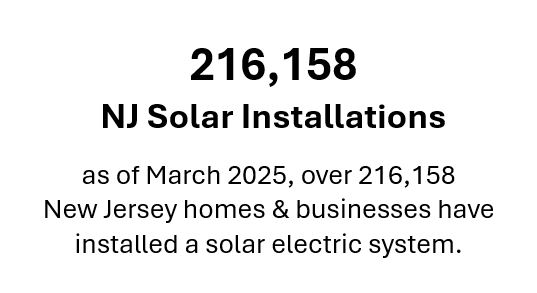Renewable Energy
Announcements
Community Solar Update
The CSEP registration manager received more than 650 MW of project registrations during the initial registration period for energy year 2025. The registration manager is currently reviewing the applications for completeness and accepting projects in order, up to the capacity allocated in each block. Staff also strongly encourages applicants to consider submitting projects into the CSI Program, which is now open until July 23 and allows applicants to submit their own price bid, or to the Remote Net Metering block, which still has capacity available. Conditional approvals for interconnection may be able to be converted from community solar to RNM or grid-supply without losing their queue position. Projects may participate in the CSI Program with a PURPA interconnection – up to 20 MWAC in PSE&G and ACE and up to 5 MWAC in JCP&L.
![]()
Per Board Order April 23, 2025, In the Matter of the Community Solar Energy Program, the Board expanded the capacity under the Community Solar Energy Program to include an additional 250 MW (dc). This capacity will be allocated amongst the four Electric Distribution Companies (EDCs) 30 MW for ACE, 72 MW for JCP&L, 144 MW for PSE&G and 4 MW for RECO’s respective service territories.
The Community Solar Energy Program (CSEP) Registration Portal will open to new registrations on April 30, 2025, at 12:01 am (EST). Visit the CSEP homepage for additional information.
Competitive Solicitation Incentive Program - Third Solicitation
Per Board Order dated April 23, 2025, effective April 30, 2025, the Board has approved a third solicitation in the CSI Program. A Pre-Qualification application window will open on May 14, 2025 at 12:01 AM EST, and close to bids on July 23, 2025 11:59:59 PM EST. The total CSI capacity target will include 300 MW of solar generation and 160 MWh of energy storage paired with grid supply solar generation. Visit the CSI Program homepage for additional information.
Reallocation of ADI Program Capacity
The Board approved via Board Order, effective March 26, reallocating 75 MW of solar capacity to the ADI residential market segment. The 75 MW will be taken from the non-residential market segment and added to the residential market segment.
Please visit the ADI Program homepage for additional information and direct access to the ADI Online Registration Portal for current available capacity for each market segment.
![]()
To stay informed and receive communication regarding NJCEP upcoming meetings and program announcements, please join our listservs.
| Important Links | |
|
|
New Jersey Renewable Energy Programs
To learn more about our renewable energy programs, click on a link below:
SOLAR PROGRAMS
Successor Solar Incentive Program (SUSI)
Dual-Use Solar Pilot Program (Pilot Program)
New Jersey Solar For All (NJSFA)
Transition Incentive Program (TI)
Legacy SREC Registration Program (SRP)OTHER RENEWABLE ENERGY PROGRAMS
Energy Storage
Grid Modernization
Offshore Wind (OSW)
Solar Programs
Why Solar: A basic guide to solar electric systems
![]()
New Jersey is committed to supporting solar energy. The Successor Solar Incentive (SuSI) Program is the current solar program which allows new solar projects to register to earn New Jersey Solar Renewable Energy Credits II (SREC-II). Older projects may be registered in one of New Jersey’s former solar programs, the SREC Registration Program (SRP) or the Transition Incentive (TI) Program, through which they continue to receive SRECs or TRECs. SRECs, TRECs, and SREC-IIs represent the clean energy attributes of electricity generated from a solar energy project.
Successor Solar Incentive (SuSI) Program
The SuSI Program provides incentives to eligible solar facilities to enable the continued efficient and orderly development of solar renewable energy generating sources throughout the state.
The SuSI Program is the long-term permanent solar program for providing incentives to new solar generation facilities connected to the transmission or distribution systems of New Jersey electric public utilities or local government units.
The SuSI Program consists of two sub-programs:
(1) The Administratively Determined Incentive (ADI) Program provides administratively set incentives for net metered residential projects, net metered non-residential, remote net metering and community solar projects of 5 MW (dc) or less. ADI Program Forms, Checklists, and additional program information can be found on the ADI Program page.
See below for additional information on the ADI Program's Community Solar Energy Program (CSEP):
The Community Solar Energy Program (CSEP) provides incentives to eligible community solar facilities to enable the continued efficient and orderly development of solar electric generating sources throughout New Jersey.
(2) The Competitive Solar Incentive (CSI) Program is designed to provide incentives to larger solar facilities within the SuSI Program.
Dual-Use Solar Pilot Program
The Pilot Program is designed to encourage the development of dual-use solar facilities and the creation of a new segment of the solar industry in New Jersey that is compatible with the State’s rich agricultural heritage. Specifically, the Pilot Program seeks to demonstrate and study the compatibility of active agricultural or horticultural production and solar photovoltaic infrastructure on the same land/property.
New Jersey Solar For All
New Jersey Solar for All is a federally funded program awarded under the U.S. Environmental Protection Agency's Greenhuse Gas Reduction Fund.
Transition Incentive (TI) Program
The Transition Incentive Program (TI) was a program in New Jersey that bridged the gap between the Solar Renewable Energy Certificate (SREC) Registration Program (SRP) and the Successor Solar Incentive Program (SuSI Program).
Legacy SREC Registration Program (SRP)
The Legacy SRP was the solar program previously used to register solar installations in New Jersey prior to its close on April 30, 2020.
Other Renewable Energy Programs
Energy Storage
Energy storage resources are critical to increasing the resilience of New Jersey’s electric grid, reducing carbon emissions, and enabling New Jersey’s transition to 100% clean energy.
Grid Modernization
NJBPU Announces Approval of Proposed Grid Modernization Rules to Build a Stronger, More Reliable Electric Distribution System
Offshore Wind
Offshore wind is a renewable energy technology that reduces the need for fossil fuel generation. By doing so, offshore wind can mitigate climate change impacts and support economic development for the New Jersey workforce.
Utility Financing Programs
PSE&G’s Solar Loan Program helps qualified business and residential
customers finance a significant portion of their solar energy system costs.
Make sure your home or building is as energy efficient as possible before installing solar. Benefits include, improved comfort and safety, lower energy bills, less renewable capacity needed, and lower upfront cost to install renewable energy. Check with your electric or gas utility regarding programs they may offer to help make your home more energy efficient.








.jpg)
